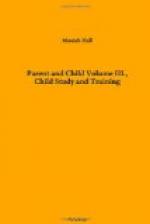The citizen in a democracy should realize that his training and education are never completed, that life itself is the great school-master and that one of the chief pleasures of existence is continued study and investigation. His occupation, no matter what it is, will offer him some opportunity for study and improvement, and a portion of his leisure time ought to be devoted to books and magazines. He may, also, if he desires, take an extension course or correspondence work offered by a higher institution of learning, some of which are making earnest efforts to take the college to the people. Every citizen should at least be identified with some civic, social, or industrial organization in his town, such as a debating and literary club, an agricultural society, or a commercial club. If each community would seek out and utilize the talent within its precinct, it might develop an intellectual and civic consciousness that would rival the spirit of ancient Greece.
An old-time prophet uttered the inspiring thought: “The Glory of God is intelligence,” and the great latter-day Prophet added the supplement: “No man can be saved in ignorance.” It is the duty of the individual, therefore, to be an eternal seeker after knowledge and perfection. In this blessed age when the sun of education shines so brilliantly, none need to slumber under the clouds of ignorance. May the sun shine until under its regenerating influence the home, school, church and state may each awaken to the full measure of its power and so prepare the way for the coming of that mightier Son of Righteousness, who promises to reign for a thousand years over a redeemed world.
LESSON XXII
QUESTIONS FOR DISCUSSION
1. Show the close relationship between the individual and the state.
2. Account for the two different standards of conduct.
3. Indicate how social influences modify the character of children.
4. How do examples of the use of tobacco and liquor affect children?
5. Compare example and precept.
6. Why must a democratic form of government develop its ideals slowly?
7. Why is community government frequently inefficient?
8. What per cent, of the population usually “sets the moral pace?”
9. What is the remedy for inefficient free government?
10. Why is the community the chief civic and social educator of children?
11. What should receive the highest award in the gift of a people?
12. How did Greece train her children?
13. What evil practices should be prohibited in a community?
14. What reforms should be national rather than local?
15. How may the few lawless individuals be restrained?
16. What is the duty of the citizen towards self-improvement and education?




